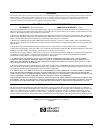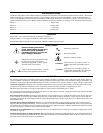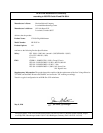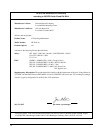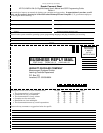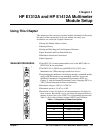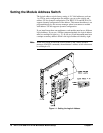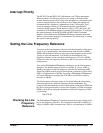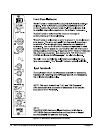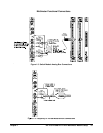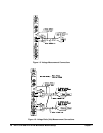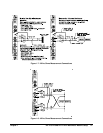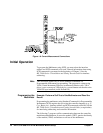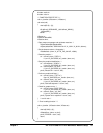
HP E1312A and HP E1412A Multimeter Module Setup 17Chapter 1
Interrupt Priority
The HP E1312A and HP E1412A Multimeters are VXIbus interrupters.
However, there is no interrupt priority level setting to be made on the
module. Interrupt priority level, setup, and activation are configured on the
resource manager which is the interface to the VXIbus and contains any
instrument drivers required to communicate with a VXI module. Your
resource manager could be a VXI command module, embedded PC
controller, the PC-based VXLink Interface (ISA-to-VXI), the Series 700
workstation VXI-MXIbus interface or another VXI controller. To configure
the interrupt priority on the HP E1405B and HP E1406A Command
Modules, you would use the
DIAGnostic:INTerrupt command subsystem.
Refer to your resource manager’s documentation for information on setting
the system’s interrupt priority.
Setting the Line Frequency Reference
You must set the line frequency reference to the line frequency of the power
source to your mainframe for maximum normal mode rejection (NMR).
NMR is the multimeter’s ability to reject power line frequency noise in a DC
voltage or ohms measurement. You should set the multimeter’s line
frequency reference to the exact power line frequency (50, 60 or 400Hz).
Failure to set the line frequency reference to that of your source will cause
reading errors.
You use the
CALibration:LFRequency command to set the line frequency
reference. The default setting at power-on is 60Hz. If you use 50Hz or
400Hz you need to set the line frequency reference for maximum NMR.
Specifying 400Hz actually sets the line frequency reference to 50Hz since
50Hz is a sub harmonic of 400Hz. Executing a
CALibration:LFRequency?
will return +50 after executing
CAL:LFR 400 to set the line frequency
reference to 400Hz.
The line frequency reference setting is also useful when the device being
measured operates at a different frequency than the multimeter. For
example, if the multimeter has a power line frequency reference of 60Hz and
the device being measured has a power line frequency of 50Hz, maximum
NMR is achieved by setting the multimeter’s reference frequency to 50Hz
by executing:
CAL:LFR 50
Checking the Line
Frequency
Reference
The CALibration:LFRequency? command returns the present setting of the
power line frequency reference. The command returns +50 or +60. For a
setting of 400Hz, +50 is returned since 50Hz is a sub harmonic of 400Hz.



